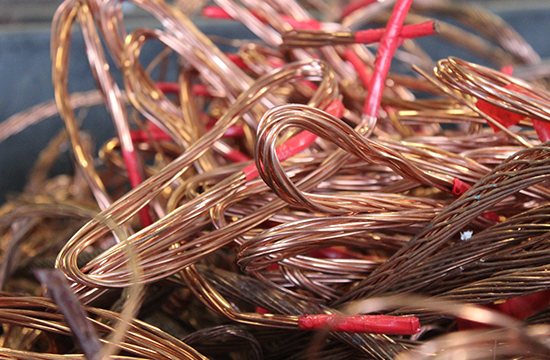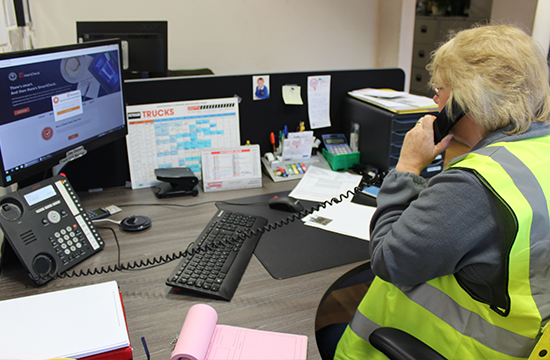The Non-Ferrous Metals We Specialise In
Because of its extensive use, non-ferrous scrap metal is usually recycled. Secondary materials in scrap are vital to the metallurgy industry – the science that focuses on studying the physical and chemical properties of metals. Non-ferrous scrap metals are sourced from industrial scrap metals, particle emissions and obsolete technology, like copper cables. Non-ferrous precious metals are usually sourced from jewellery, electronics and used industrial catalysts.
Some of the non-ferrous scrap metal that we specialise in includes:
Aluminium
When it comes to aluminium scrap recycling, we work with the metal in the form of rolled, clean wheels, extrusions and cast aluminium.
Aluminium has many properties that make it sought after in many industrial sectors, including the food industry and transportation. Some of its most common properties include:
- Reduced weight – aluminium has low density, weighing only 2.7 g/cm3
- Ductility – the metal is soft, easy to work with and is a 2.75 in the Mohs scale of hardness
- Conductivity – aluminium is a great thermal and electrical conductor
- Reflectivity – capable of reflecting light and heat
- Non-toxic – aluminium has no odour and is non-toxic
Aluminium can be 100% recyclable without losing quality. At our aluminium recycling plant, we process this metal for use in a wide range of applications, from toys and cutlery to drinking cans and bicycles.
Copper
For Morecambe Metals, copper recycling means taking heavy copper, wiring and piping, as well as clean, tinned and dry bright copper, and processing it all for use in a range of industries. We’re also able to work with copper tanks. Copper is a versatile metal that can be found in electrical equipment, boat propellers, water tanks, doorknobs and car radiators.
Copper has many properties, such as:
- Resistance to corrosion – copper is highly resistant to corrosive substances, including oxygen
- Malleability – this metal is easy to work with and fabricate
- Hygienic – copper has anti-bacterial properties, and copper compounds have been used as fungicides and wood preservatives for a long time
- Strength – copper is a tough metal that doesn’t shatter in temperatures below 0oC
- Easy to alloy – copper can be alloyed with metals like zinc and nickel
- Conductivity – great electrical and thermal conductor
Copper recycling is crucial, as global demand for this metal keeps rising.
Brass
We also specialise in brass recycling, which includes brass fixings in bathrooms, gears, doorknobs and various castings.
Brass is an alloy of copper and zinc, and it’s often found in decorations, jewellery, lights and wind instruments. There are three main types of brass: alpha (less than 37% zinc), beta (more than 45% zinc) and alpha-beta brass (between 37% and 45% zinc), and the main difference between them is how much zinc they have.
Some of the properties of brass include:
- Strength – some variants are harder and stronger, while others are soft and ductile
- Resistance to high temperatures – some types of brass are good for working at high temperatures as they resist cracking
Stainless Steel
As for stainless steel recycling, Morecambe Metals can easily process 18/8, 316 solids and turnings and all other nickel alloys. Stainless steel is an alloy of iron, manganese and a minimum of 10.5% chromium. It comes in several types, such as austenitic, ferritic and martensitic.
The properties of this alloy include:
- Hardness – stainless steel is harder and less malleable than carbon steel
- Resistance to corrosion – this alloy is resistant to rust as well as to scratching
- Durability – stainless steel is long-lasting
- Resistance to high temperatures – stainless steel can be used in environments where extreme temperatures are a concern
Stainless steel recycling also allows for this material to be recycled several times without losing quality.
Lead
Lead recycling usually takes the form of lead piping and soft lead sheets. Lead can be traced back to 4,000 BC, but its toxicity was only discovered in the 19th century.
Lead is used for several different applications. These include radiation shielding, leaded gasoline, plumbing, batteries, roofing and cladding, nuclear reactors and weights for lifting. Despite its toxicity, lead is a popular material, as has properties which include:
- Ductility – lead is malleable and soft and is a 1.5 on the Mohs scale of hardness
- Resistance to corrosion – because lead is resistant to corrosion, it’s often found in places like underwater cables
- High density – lead is one of the denser materials, which allows it to be used in screens to protect against sound and vibrations
- Low melting point – this material has a low melting point of 327oC
- Non-corrosive – lead isn’t corrosive, so it’s suitable for lining tanks that contain sulfuric acid.
When it comes to processing for non-ferrous metal recycling, we use various techniques and machinery for sorting and producing quality recycled material that is prepared ready for furnace and smelter feeds. This allows it to be recycled into new products.
Contact Us Today about our Non-Ferrous Recycling Services
If you need non-ferrous metal recycling services for scrap material, such as aluminium, copper, brass, stainless steel or lead, then Morecambe Metals are here to help.
Our services include the provision of containers, skips and bins and collection for all non-ferrous scrap metal.
If you’d like more information about non-ferrous metal recycling or the services that we provide, then please don’t hesitate to contact us.
You can give us a call on 01524 69191 and a member of our expert team will be more than happy to help you.



